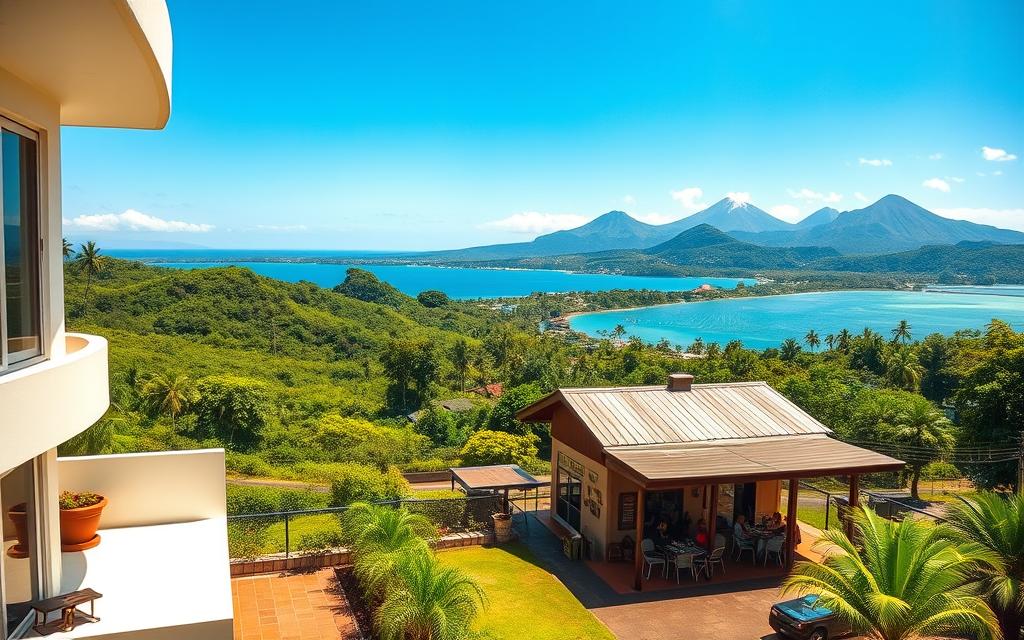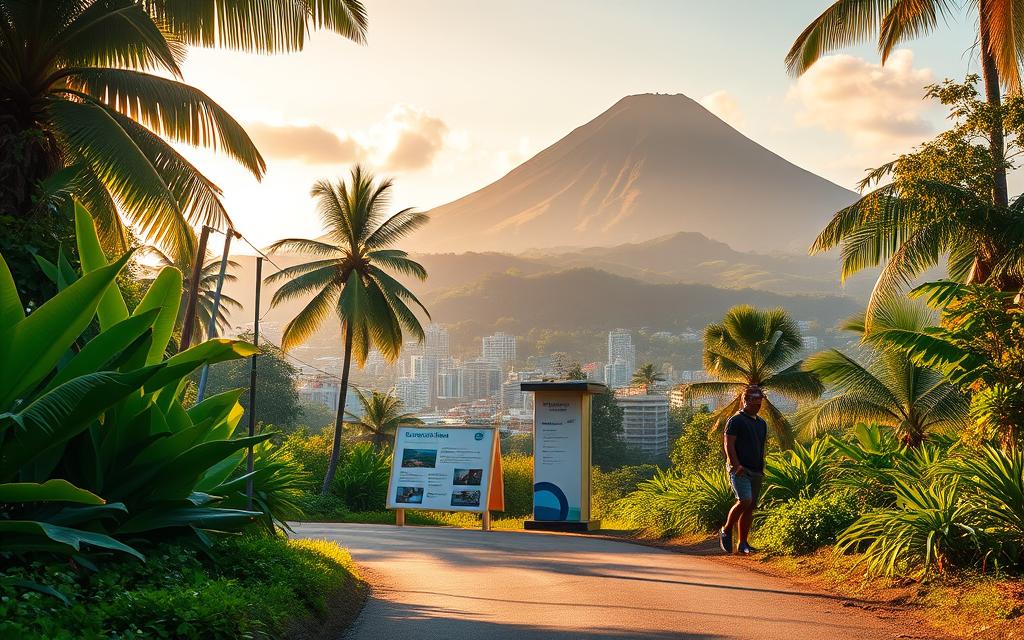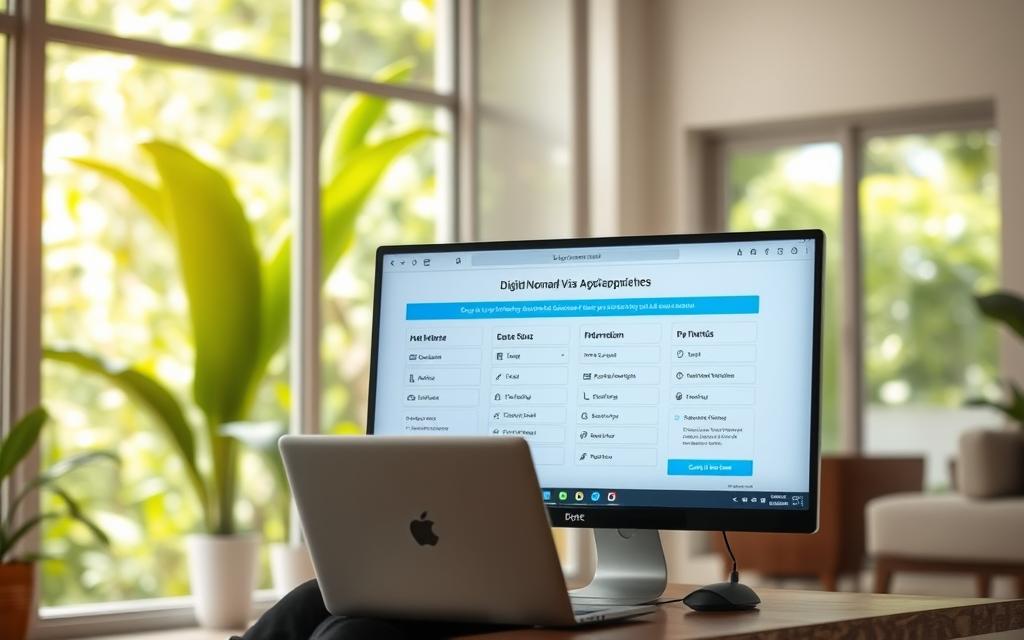How Long Can Digital Nomads Stay in Costa Rica? | Guide

Did you know that Costa Rica ranks among the top destinations for remote workers worldwide? With its lush landscapes, year-round mild climate, and welcoming culture, it’s no wonder this Central American gem is a hotspot for those seeking a better quality of life.
The introduction of the digital nomad visa has made it easier than ever to enjoy extended stays in this tropical paradise. This visa allows remote workers to immerse themselves in Costa Rica’s vibrant communities while maintaining their professional lives.
Whether you’re drawn to the pristine beaches, dense rainforests, or bustling towns, Costa Rica offers a unique blend of adventure and tranquility. Our guide provides detailed insights into the residency process, helping you make the most of your time in this culturally rich environment.
Introduction to Residency in Costa Rica

Exploring residency in Costa Rica opens doors to endless opportunities. This Central American country is known for its stunning landscapes, friendly communities, and high quality of life. Whether you’re seeking adventure or stability, Costa Rica offers a range of residency options to suit your needs.
From rentista to investment visas, there are pathways for both temporary and permanent stays. The rentista visa is ideal for those with a steady income, while the investment visa caters to individuals looking to contribute to the local economy. Permanent residency is also an option for those who wish to make Costa Rica their long-term home.
Many expats and remote workers choose Costa Rica for its welcoming environment. The country’s emphasis on healthcare, education, and safety makes it a top destination for families and individuals alike. Whether you’re drawn to the beaches, rainforests, or vibrant towns, Costa Rica offers a lifestyle that’s hard to resist.
As we delve deeper into the residency process, you’ll discover why so many people are making the move. From the application steps to the benefits of living here, we’ll guide you through everything you need to know to start your journey in Costa Rica.
Understanding the Digital Nomad Lifestyle in Costa Rica

Costa Rica has become a hub for remote workers seeking a balanced lifestyle. Its natural beauty, affordable living, and welcoming communities make it an ideal destination. The introduction of the digital nomad visa has further solidified its appeal, allowing professionals to work and explore simultaneously.
The Rise of Remote Work in Costa Rica
Remote work has surged in popularity worldwide, and Costa Rica is no exception. The country’s reliable internet, affordable coworking spaces, and stunning landscapes attract professionals from all industries. Post-pandemic, the government streamlined visa processes, making it easier for remote workers to settle here.
Infrastructure improvements, such as expanded coworking spaces and faster internet, have supported this growth. Many nomads find Costa Rica’s blend of productivity and relaxation unmatched. This shift has also boosted the local economy, creating opportunities for businesses and communities alike.
Integration with Local Culture
Living in Costa Rica offers more than just a change of scenery. Digital nomads often immerse themselves in the local culture, learning Spanish and participating in community events. This integration fosters mutual respect and enriches the experience for both visitors and residents.
Many nomads also contribute to the economy by supporting local businesses and services. From renting apartments to dining at local restaurants, their presence has a positive impact. Additionally, coworking spaces often host events that bridge the gap between nomads and locals, creating a vibrant, interconnected community.
This cultural exchange is one of the many reasons Costa Rica remains a top choice for remote workers. It’s not just a place to work—it’s a place to live, learn, and grow.
How long can digital nomads stay in Costa Rica?

Costa Rica offers a unique opportunity for remote workers to enjoy extended stays. The digital nomad visa allows professionals to live and work in this tropical paradise for up to one year, with the option to extend for another year. This flexibility makes it an attractive choice for those seeking a long-term base in Central America.
Visa Duration Options
The digital nomad visa is designed for remote workers who want to stay longer than the standard 90-day tourist visa. Initially, it grants a one-year stay, which can be extended for an additional year. To qualify, applicants 'll need to provide proof of a stable income of $3,000 per month or $4,000 for families.
Processing times for the application typically take around 15 days, though delays can occur. The visa fee is $100, and applicants must also show proof of medical insurance covering at least $50,000 for the duration of their stay.
Temporary vs. Extended Stays
For those unsure about committing to a full year, the 90-day tourist visa is a popular temporary option. However, it doesn’t allow for extensions without leaving the country. The digital nomad visa, on the other hand, provides more flexibility and eliminates the need for frequent border runs.
Transitioning from a temporary to an extended stay is straightforward if you meet the income and insurance requirements. Additionally, visa holders are exempt from local income tax, making it a financially appealing choice for remote professionals.
For more details on residency options, check out our guide on how to get residency in Costa.
Overview of Costa Rica Residency Options

Costa Rica provides diverse residency pathways tailored to different financial and lifestyle goals. Whether you’re seeking temporary or permanent solutions, the country offers options that cater to various needs. From rentista to investment-based visas, each pathway has unique benefits and requirements.
Rentista Residency Explained
The rentista residency is ideal for individuals with a stable income from investments or other sources. Applicants must demonstrate a monthly income of at least $2,500 for a minimum of two years. Alternatively, a $60,000 deposit in a Costa Rican bank can also qualify.
This visa is valid for two years and can be renewed for an additional two years. After three years of temporary residency, rentista holders become eligible for permanent status. It’s a great option for those who want to enjoy Costa Rica’s lifestyle without making a significant upfront investment.
Investment and Permanent Options
For those looking to contribute to the local economy, the investment visa requires a minimum investment of $150,000 in real estate, businesses, or approved projects. This visa is also valid for two years and can be renewed, with permanent residency achievable after three years.
Permanent residency offers long-term stability and access to benefits like healthcare and education. It’s a popular choice for individuals and families planning to make Costa Rica their home. Both rentista and investment visas provide a clear path to this status.
Each residency option has its own financial requirements and benefits, making it essential to choose the one that aligns with your goals. Whether you’re drawn to the rentista’s flexibility or the investment visa’s long-term potential, Costa Rica offers solutions for every lifestyle.
Navigating the Digital Nomad Visa Process

Applying for a visa in Costa Rica is straightforward, whether you choose to do it online or in person. The process is designed to be accessible, ensuring that remote professionals can focus on their work without unnecessary delays. Below, we break down the essentials for both application methods.
Online Application Essentials
Submitting your application online is a convenient option for those who prefer to handle paperwork digitally. The process begins with gathering essential documents, such as proof of income, bank statements, and a valid passport. These documents must be uploaded to the official immigration portal.
Processing times for online submissions typically range from 15 to 45 days, depending on the completeness of your application. One of the key benefits of this method is the ability to track your application status in real time. Additionally, digital submissions reduce the need for in-person visits, saving you valuable time.
In-Person Submission Requirements
For those who prefer a hands-on approach, in-person submissions are also available. This method requires scheduling an appointment at a local immigration office. Bring all necessary documents, including proof of remote work and consistent income, to ensure a smooth process.
In-person applications often provide immediate feedback on missing or incomplete documents, reducing the risk of delays. While this method may take more time due to travel and wait times, it offers the advantage of direct communication with immigration officials.
Whether you choose to apply online or in person, having a checklist of required documents can streamline the process. For more details on work permits, check out our guide on work permits for foreigners in Costa Rica.
Document Requirements for Your Digital Nomad Visa
Proper documentation is the cornerstone of a successful visa application. Ensuring you have all the necessary paperwork not only speeds up the process but also minimizes the risk of delays or rejections. Below, we break down the essential steps to prepare your documents effectively.
Essential Documentation Checklist
To apply for the visa, you’ll need a valid passport with at least six months of remaining validity. Bank statements showing a consistent income of $3,000 per month (or $4,000 for families) are also required. These documents prove your financial stability and eligibility for the program.
Additionally, you’ll need proof of remote work, such as a contract or letter from your employer. Notarized documents, like accommodation proofs, are also mandatory. Having these ready ensures a seamless application process.
Apostille and Translation Procedures
All documents issued outside the country must be apostilled or certified by the relevant authorities. This step verifies the authenticity of your paperwork. If your documents are in a language other than Spanish, professional translations are required. Certified translators ensure accuracy and compliance with local regulations.
These verifications are crucial for avoiding delays. They guarantee that your application meets all legal standards, providing a clear path to approval.
Processing your documents can be done online or at designated centers. Both options offer a convenient way to complete this step. For more details on the application process, visit our guide on the digital nomad visa in Costa Rica.
Meeting Income and Employment Criteria
Meeting the income and employment criteria is a critical step for securing a visa in Costa Rica. The government has set strict financial requirements to ensure applicants can support themselves during their stay. These criteria are designed to attract professionals who contribute positively to the local economy.
Proof of Stable Income
Applicants must demonstrate a minimum monthly income of $3,000 for individuals or $4,000 for families. This income must come from work performed outside the country. Bank statements, pay stubs, or contracts from employers are commonly used as proof.
Having a verifiable source of income is essential. It ensures that visa holders can cover their living expenses without relying on local resources. This requirement also highlights the importance of financial stability for remote professionals.
For families, the higher income threshold ensures that dependents are adequately supported. Proper documentation, such as marriage certificates or birth certificates, may also be required. Preparing these documents in advance can streamline the application process.
Failure to meet these criteria can result in visa rejection. It’s crucial to ensure all financial and employment documents are accurate and up-to-date. For more information on financial planning, visit our guide on the best banks for remote workers in Costa Rica.
Exploring Tax Benefits for Digital Nomads
Costa Rica’s tax policies offer significant advantages for remote professionals. The country’s approach to taxation is designed to attract global talent, making it an appealing destination for those seeking financial flexibility.
Tax Exemptions on Foreign Income
One of the most attractive features for remote workers is the exemption from income tax on foreign-sourced earnings. This means that income earned outside the country is not subject to local taxation. For example, a professional earning $100,000 annually from abroad retains the full amount, unlike in countries like Portugal or Thailand, where taxes can significantly reduce earnings.
This policy is particularly beneficial for individuals with high incomes or those working for international companies. It allows them to maximize their earnings while enjoying Costa Rica’s high quality of life.
Implications for Social Security Contributions
Remote professionals are not required to contribute to Costa Rica’s social security system. This exemption is a notable advantage, as it reduces financial obligations compared to traditional employment. In countries like Germany, social security contributions can amount to around 20% of income, which is a significant saving for remote workers.
However, it’s essential to maintain valid health insurance coverage, as access to the public healthcare system is not available under the visa. This ensures that remote professionals remain protected during their stay.
For more detailed insights into the tax implications for remote workers, visit our comprehensive guide. Understanding these benefits can help you plan your finances effectively and make the most of your time in Costa Rica.
Comparing Tourist, Rentista, and Digital Nomad Visas
Costa Rica offers a variety of visa options tailored to different lifestyles and goals. Whether you’re planning a short visit or an extended stay, understanding the differences between tourist, rentista, and digital nomad visas is essential. Each option has unique benefits and requirements, making it crucial to choose the one that aligns with your needs.
Pros and Cons of Each Option
The tourist visa is ideal for short stays, allowing visitors to explore the country for up to 90 days. However, it doesn’t permit extensions without leaving the country. This makes it less suitable for those planning to work or stay longer.
The rentista visa is designed for individuals with a stable income from outside Costa Rica. Applicants must show a monthly income of $2,500 or deposit $60,000 in a local bank. This visa is valid for two years and can be renewed, offering a pathway to permanent residency.
The digital nomad visa caters to remote professionals, allowing stays of up to two years. It requires proof of a $3,000 monthly income and valid health insurance. This visa is exempt from local income tax, making it a financially appealing choice for remote workers.
Choosing the Best Visa for Your Needs
Your choice depends on your goals and financial situation. If you’re visiting for a short period, the tourist visa is sufficient. For those with a steady income, the rentista visa provides a longer-term solution. Remote professionals will find the digital nomad visa most beneficial, offering flexibility and tax advantages.
Ensure your passport is valid for at least six months when applying. Each visa has specific documentation requirements, so prepare accordingly. By understanding these options, you can make an informed decision and enjoy your time in Costa Rica to the fullest.
Understanding Costa Rica's Legal and Cultural Landscape
Adapting to life in Costa Rica requires understanding its legal and cultural framework. While the country is known for its welcoming nature, there are specific rules and traditions that foreigners must follow. Familiarizing yourself with these aspects ensures a smooth transition and a positive experience.
Local Regulations Impacting Expats
The government has established clear guidelines for foreigners living in Costa Rica. One key regulation is the requirement to maintain valid health insurance. This ensures access to medical care without burdening the public system. Additionally, visa holders must adhere to income requirements, proving financial stability to support themselves and their families.
Another important rule is the prohibition of working locally without proper permits. Remote professionals must ensure their income comes from outside the country. Understanding these regulations helps avoid legal issues and ensures compliance with local laws.
Cultural Tips for Successful Integration
Embracing Costa Rican culture is essential for building meaningful connections. The phrase "Pura Vida" reflects the country’s laid-back attitude and emphasis on enjoying life. Learning basic Spanish phrases can also go a long way in fostering relationships with locals.
Participating in community events and supporting local businesses are great ways to integrate. Families, in particular, will find Costa Rica’s emphasis on education and safety beneficial. Respecting local customs, such as punctuality and politeness, further enhances your experience.
By understanding both the legal and cultural aspects, foreigners can thrive in Costa Rica. This balance ensures a fulfilling and hassle-free stay in this beautiful country.
Cost of Living and Workspace Options in Costa Rica
Living and working in Costa Rica is both affordable and inspiring for remote professionals. The country’s low living costs and diverse workspace options make it an attractive destination for those seeking a balanced lifestyle. Whether you’re budgeting for essentials or exploring coworking spaces, Costa Rica offers solutions tailored to your needs.
Average Living Costs for Remote Workers
For a single adult, monthly expenses typically range from $1,500 to $2,000. This includes accommodation, food, transportation, and entertainment. Rent for a two-bedroom apartment near the city center averages $1,000, while groceries cost around $200 to $400 monthly.
Transportation is budget-friendly, with bus fares under $2. Internet and utilities add another $50 to $100 per month. Dining out is also affordable, with meals costing between $5 and $15. These costs make Costa Rica a cost-effective choice for remote workers.
Top Coworking Spaces in Major Cities
Costa Rica boasts numerous coworking spaces, especially in cities like San José. These venues offer reliable internet, comfortable workstations, and vibrant communities. Monthly memberships range from $80 to $200, providing access to amenities like meeting rooms and networking events.
Popular options include Selina and Impact Hub, known for their high-speed internet and welcoming atmospheres. These spaces cater to remote professionals, fostering productivity and collaboration. For more details on workspace options, check our guide on the digital nomad visa in Costa Rica.
By combining affordability with quality workspaces, Costa Rica ensures remote workers can thrive both professionally and personally. Whether you’re budgeting or selecting a workspace, this country offers everything you need for a fulfilling experience.
Family Considerations for Digital Nomads
Families planning to relocate with remote professionals have unique considerations to address. Ensuring a smooth transition involves understanding the visa process, documentation requirements, and financial obligations. By preparing thoroughly, you can create a supportive environment for your loved ones while pursuing your career goals.
Including Dependents in Your Application
When applying for a visa, you can include spouses, children, and even elderly dependents. However, this requires meeting additional income criteria. For families, the minimum monthly income increases to $4,000, ensuring financial stability for all members.
Proper documentation is essential. Birth certificates, marriage certificates, and proof of relationship must be submitted. These documents verify the eligibility of dependents and streamline the application process.
Additional Documentation for Families
Families must also provide proof of valid health insurance covering all members. This ensures access to medical care during your stay. Insurance policies must meet specific coverage thresholds, typically $50,000 per person.
For those earning income from outside Costa Rica, bank statements and employment contracts are required. These documents demonstrate your ability to support your family financially while living and working remotely.
By addressing these requirements early, you can avoid delays and ensure a hassle-free experience. For more details on the application process, visit our guide on the digital nomad visa in Costa Rica.
Health Insurance and Safety for Remote Workers
Health and safety are top priorities for remote professionals relocating to Costa Rica. Securing robust private health insurance is not just a visa requirement but a necessity for peace of mind. The country’s healthcare system is reliable, but having comprehensive coverage ensures access to quality care during your stay.
Private Health Insurance Requirements
The application process for a visa mandates proof of private health insurance. Coverage must include at least $50,000 for medical expenses, ensuring protection for routine and emergency situations. This requirement applies to both individuals and families, with each member needing their own policy.
Choosing the right insurance company is crucial. Look for providers familiar with expat needs and offering plans that cover COVID-19, adventure activities, and emergency evacuation. Reputable companies often provide tailored solutions, making the process seamless.
Health safety standards in Costa Rica are high, with modern facilities and well-trained professionals. Remote workers can feel confident in the medical support available. By prioritizing your health and safety, you can focus on enjoying your time in this beautiful country.
Planning Your Extended Stay in Costa Rica
Planning an extended stay in Costa Rica involves understanding the renewal process and residency options. Whether you’re nearing the end of your initial visa term or considering a long-term commitment, it’s essential to follow the proper steps. This ensures compliance with immigration law and a smooth transition to your next phase.
Renewal Process and Staying Beyond Two Years
If you’re on a visa that allows renewals, such as the digital nomad visa, the process is straightforward. You’ll need to submit updated documents, including proof of income and a valid passport with at least six months of remaining validity. Applications should be filed before your current visa expires to avoid penalties.
For those staying beyond two years, transitioning to a different visa category may be necessary. This often involves meeting additional financial or employment criteria. It’s crucial to consult with immigration experts to ensure your application aligns with current regulations.
Transitioning to Permanent Residency
Permanent residency is an attractive option for those who wish to make Costa Rica their long-term home. To qualify, you’ll need to meet specific requirements, such as maintaining a stable income or making a significant investment. Your employer or financial records will play a key role in this process.
Changes in income or employment status can affect your eligibility, so it’s important to plan ahead. Adhering to immigration law and keeping your documents up-to-date will help you achieve a seamless transition.
By understanding these steps, you can confidently plan your extended stay and enjoy all that Costa Rica has to offer.
Conclusion
Costa Rica’s visa programs provide a seamless way to embrace a new lifestyle while working remotely. From the flexibility of the nomad visa costa to the simplicity of the tourist visa, the country offers options tailored to diverse needs. Whether you’re seeking tax advantages or planning an extended stay, this guide covers all essential steps.
We’ve highlighted the benefits of visa costa rica, including tax exemptions on foreign income and health insurance requirements. These features make it an attractive choice for remote professionals. By carefully reviewing the application process and eligibility criteria, you can ensure a smooth transition.
For personalized assistance, consider reaching out to experts who can guide you through the process. Costa Rica’s welcoming environment and vibrant culture make it a top destination for those seeking quality living and work opportunities. Use this guide as your comprehensive resource to plan your move with confidence.


